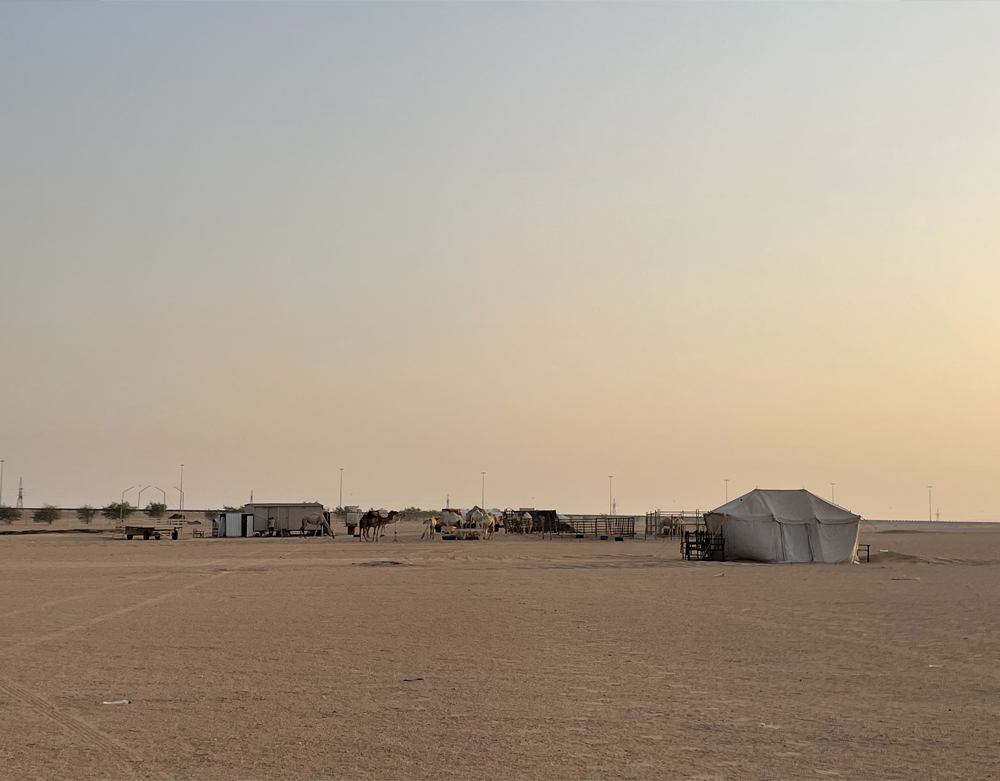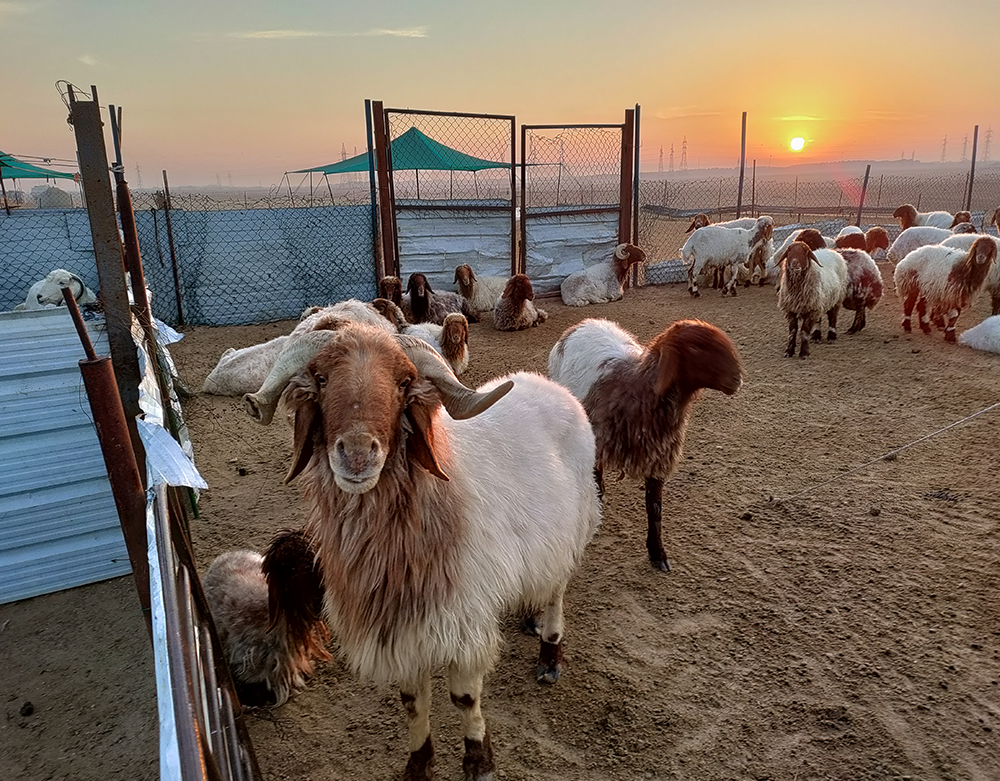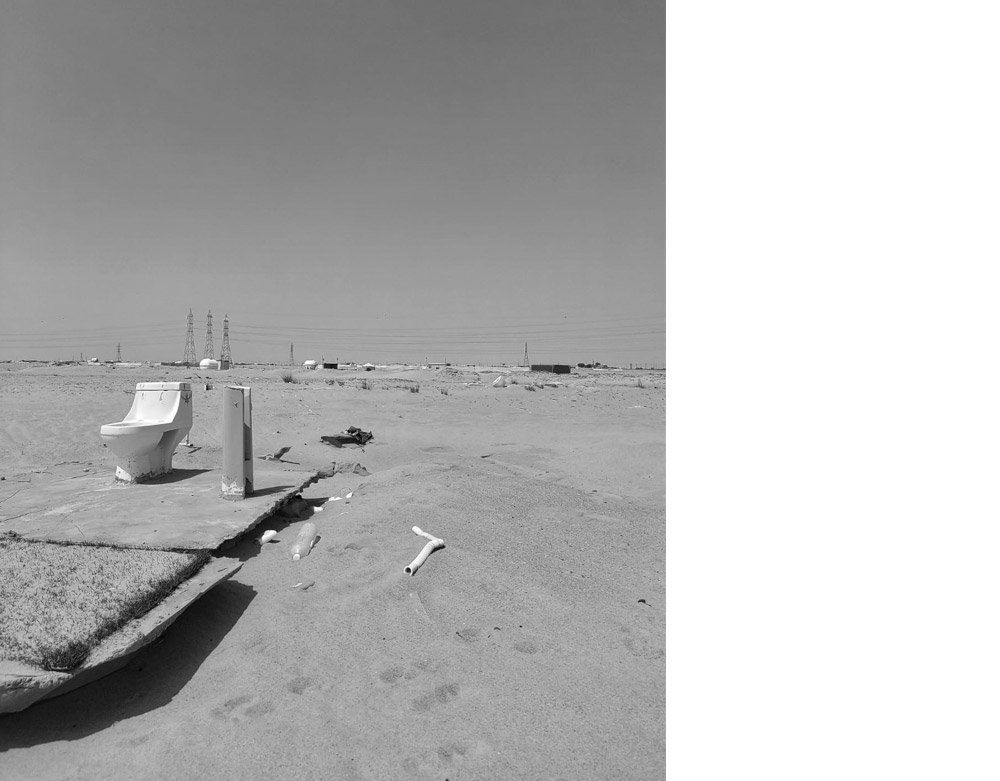
Desert Days of the Forgotten is a community initiative aimed at researching and documenting the lived realities of low-income migrant workers employed as shepherds in Kuwait. The project examines the living and working conditions of shepherds in different farming locations in Kuwait. Desert Days is one of three community projects to emerge through the BUILD program, implemented by the en.v initiative and funded by the Swiss Agency for Development and Cooperation.
As a subset of the migrant worker population, shepherds are largely absent from existing research on low-income migrant workers in Kuwait which leans towards a focus on domestic workers and workers in the construction sector. There is little official and accessible data on the terms of their employment, the policies governing their contracts and legal rights, working locations, their relationship with employers and their everyday lives in the desert. Local civil society groups, including those advocating for migrant worker rights havea limited understanding of the lived experiences of this section of workers and the specific challenges they face. The few reports that do exist indicate that this subsection of workers is particularly vulnerable to labor rights violations and unsafe working conditions, specifically with reference to the extreme climatic conditions in the desert areas where they reside and work.
Migrant shepherds live and work in the most remote areas of Kuwait and largely lead a nomadic, seasonal lifestyle due to the country’s extreme climate and their livestock's grazing migratory patterns. Our report highlights their living and working conditions in more detail.
In addition to raising awareness, Desert Days sought to use the findings of our research to design a sustainable and cost-effective dwelling prototype suitable for the desert environment and shepherds’ needs and that can be constructed collaboratively.

To shed light on the living and working conditions of migrants working as shepherds in Kuwait's desert.

Our findings and recommendations to support future work in the field.
Meet the passionate people behind our cause and those who go beyond to support us.

Raised in Kuwait, Batul is an international development professional with expertise in civic engagement and impact assessment in the Middle East. Her research interests include migration and development policy as well as citizenship in the Arabian Peninsula. She holds an MA in Law and Diplomacy from the Fletcher School at Tufts University and a BA in International Relations from the American University of Kuwait.
I joined the team to support the data collection exercise. Community projects must listen carefully to those they aim to serve, and I wanted to help the Desert Days team effectively engage with the workers the initiative is built around.
There's life in this image. You can see trees, camels, and the shepherd in the background-- perhaps taking a break from his work. But it's also a rather remote scene. It reminds me of how so many of the individuals the team spoke with are socially isolated, relying primarily on phone calls to home for a genuine human connection.


I am an architect, designer, and creator who graduated from Kuwait University’s College of Architecture. My core value is to strive for sustainability and ethics in design by looking for both the beauty and opportunity in re imagining and turning fleeting moments from everyday life into permanent - and functional - displays of art and space to be enjoyed by all.
I strongly believe in human rights and that every human on earth should have the right to a dignified and safe life, surrounded by like-minded individuals and provided basic needs at any given time. This project was the perfect opportunity for me to be able to offer my expertise - design - towards providing the migrant community with a more dignified way of life which is not always offered to them by their employers.

This is Hassan. I studied BSc Biomedical Sciences and currently work at Al Amiri Hospital.
My passion towards helping people and trying to cause a change, even at a small level, made me join this project. Further, working with an excellent group of people gave me the motivation to move forward and achieve what is required!
I chose this image taken by Abdulqader, one of the Shepherds, as it represents the trip in multiple ways. How simple and peaceful life is out there. Further, the problems that are hidden within the landscape and the environment. In other words, when we went to the desert, I was fascinated by how most workers were appreciating a simple life. Yet there were many issues that they chose to ignore.


Nadeen Dakkak is a UK-based academic whose research is interested in migration in the Gulf region, particularly within the field of literary and cultural studies. Born and raised in Kuwait, she is also personally invested in pushing against the exclusion and marginalization of migrants in the country.
I joined Desert Days of the Forgotten with the aim of engaging with local initiatives that seek to improve the conditions of migrant workers, and with the hope of both contributing to and learning from the knowledge and experience of others working within such initiatives.

Nazreen Nazeer is an Indian from Kuwait whose professional experience is across investment management, financial advisory and audit. She enjoys musing on the sociocultural aspects of her ever-evolving identity. She tries to volunteer her time and energy toward community initiatives that want to see more people actually thrive, as a way of giving back to society and simultaneously indulging her amateur anthropologist side.
I liked that the team ventured to work with a section of the migrant worker population that was oft-forgotten by virtue of their relative isolation from city life, and how they conceptualized their idea for a sustainable and scalable dwelling solution.
This was taken on our first field trip and it felt great to connect to nature and get close to these gentle creatures, always a welcome change from the concrete jungle.


Nourah Al-Sulaiman holds a BA in International Relations with a minor in History. She joined Migrant-rights.org’s team in 2017 and has been managing the Ensaniyat Fellowship Program in Kuwait and Qatar since. Through the Fellowship, Nourah works with youth members of the society to utilize the power of dialogue and initiating conversations to achieve change in attitudes towards migrant and domestic workers in the Gulf.
Regardless of working on migrant workers issues for 5 years now, the working and living conditions of shepherds were never topics that came up. This speaks volumes to how detached they are from advocacy that takes place within our cities – showing a direct correlation to how physically detached they are as well, having the desert as their work and living space. It was important for me to break-down the layers of conditions they face in order to raise the right type of awareness within society, all with the hope of fostering long-term changes.
I chose this photo because at first glance, you see what looks like a smiling camel. The photo feels positive and uplifting when looking at it in that way. Removing the smiling camel from the photo, I now see the reality that shepherds live in. An endless, empty, soul-less piece of land with not a single thing in sight but sand. This is what shepherds wake up to. A lonely land, with nothing but the animals they are herding to keep them company. Isolated from the rest of “us.” An “us” that rarely ever stops to think about how it would feel if this was our reality. A shepherd’s reality that needs to be changed.


Ever since Lubna Saif Abbas was a child of six, she was fascinated with beads and the way they were used. In the summer of 1970 while her family was living in Indiana her father took them on a road trip down South and then West going through several Cherokee reservations in Georgia. At one reservation Lubna recalls a group of women in a corner using quills and beautiful big round pony beads in primary colors. Her family wanted to continue to visit other areas, she said “all I wanted to do was watch these women as they conversed and were beading away. I was glued to that corner and did not want to move or see anything else.” Attending American University to obtain a Bachelors of Arts and Science in Graphic Design and a Minor in Art History. Upon returning to Kuwait after the Iraqi invasion and occupation in 1991, Lubna began a fifteen year career introducing and developing the field of Marketing Communications. During this period, Lubna was delving and researching textiles, embroidery, embellishing and beads as well as continuing her interest in papers and crafts. Learning from masters in lamp-work, off loom weaving and precious metal clays the groundwork was established. At the same time, Lubna was intensively creating unique objects of beaded body adornment.
This has been a key part of my advocacy work and working on this initiative of DDOF was led by a desire to impart the creative process for empowerment and autonomy of the shepherds reclaiming their voices
The image of the sanitary ware in a black and white photo I captured during one of our visits really resonated in terms of the human and environmental impact this had on the lives of the shepherds and the habitat.
